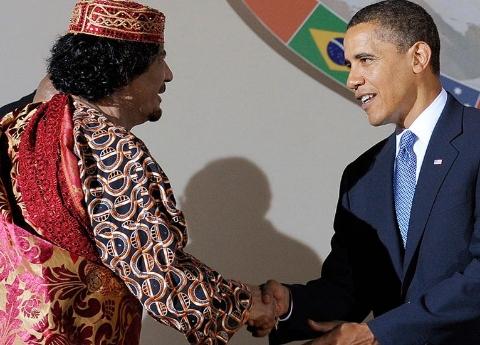Weeks of uprising in Libya against the Libyan leader, Colonel Mummar Gaddafi, has led to a civil war between pro-Gaddafi military forces and opposition rebels that are partially made up of military deserters. Gaddafi’s forces have been attempting to retake rebel-controlled towns in western and eastern Libya. Both forces have been locked in a stalemate during clashes in the eastern of towns of Mistrata and Zawiya, while several media outlets have reported that the military regained control of the western town of Bin Jawad. Air strikes have also been launched against the rebel-held western oil port of Ras Lanuf.
As the chaos continues within Libya, Gaddafi’s regime has become increasingly isolated on the global scale. Most of his former allies have stopped supporting him and condemned the recent violence.
Until the uprising in the Arab world, Libyan relations with the U.S. and NATO allies have been close and friendly. In 2006, Gaddafi’s regime, which is a secular and nationalist Arab government, was removed from the U.S. list of state sponsors of terror after scrapping their WMD program, and condemning and ceasing support of terrorism toward the U.S.
Former Western allies saw Libya as a secure source of oil. Since the beginning of the 21st century, Libya’s government began to moderate by opening important sectors of the country to foreign investment, and privatizing public enterprises through the aid of the International Monetary Fund (IMF). In the past, Western leaders like Tony Blair, Hilary Clinton, Nicolas Sarkozy, and Jose Luis Zapatero openly supported Gaddafi and his regime.
Now his former allies are condemning the violence against Libyan protesters and threatening Gaddafi with military action, trial by the International Criminal Court (ICC), and have enacted economic sanctions. Ironically, Western allies like the UK supplied many of the arms that the Libyan military used to suppress the protesters. Months before the uprising the U.S. had approved a $77 million deal to deliver armed troop carriers.
The U.S. and NATO allies have stated that whey will not rule out direct military action against Libya and considering a wide list of military options, which include arming the rebels. A British diplomat has claimed that France and the UK have drawn up a UN resolution for a no-fly zone over Libya. As a U.S. naval and air force is gathering off the Libyan coast, U.S. Senators John McCain and John Kerry have become openly supportive of a no-fly zone plan. Russia has stated its opposition to military action against Libya and can veto any UN Security Council Resolution.
Some Western governments have been trying to establish contact with the Libyan rebels in Eastern Libya. A recent covert UK operation ended in an embarrassing failure for the British government. MI6 and SAS officers, and “armed diplomats” that had been dispatched in Eastern Libya to try to establish “diplomatic” contact with the opposition leaders, were arrested by a rebel militia night watch. They were held under house arrest for four days until they were released and sent out of Libya.












